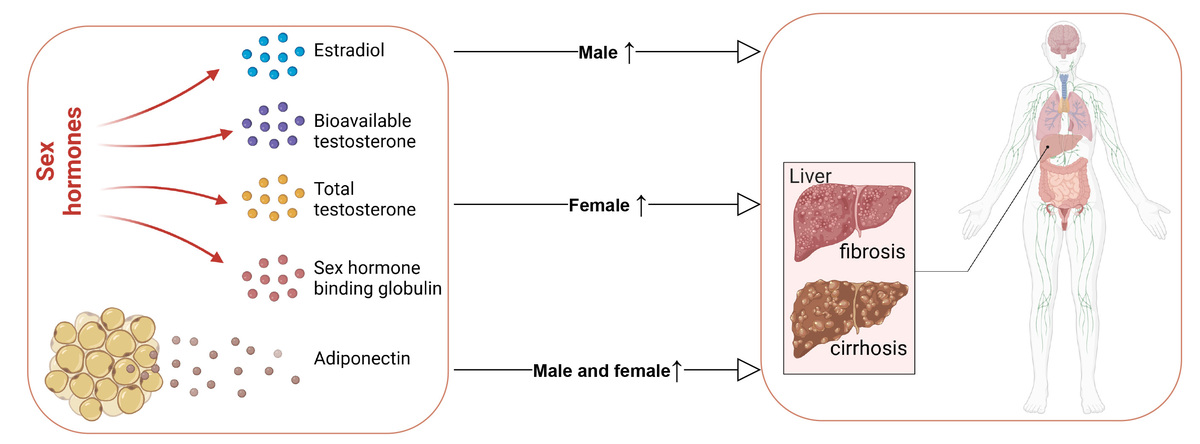Current issue
Archive
Manuscripts accepted
About the Journal
Editorial office
Editorial board
Section Editors
Abstracting and indexing
Subscription
Contact
Ethical standards and procedures
Most read articles
Instructions for authors
Article Processing Charge (APC)
Regulations of paying article processing charge (APC)
HEPATOLOGY / RESEARCH PAPER
Investigating the potential impact of sex hormones and adiponectin on the risk of liver fibrosis and cirrhosis: a mendelian randomization study
1
Shanghai Fourth People’s Hospital, School of Medicine, Tongji University, China
2
Children's Hospital, School of Medicine, Shanghai Jiao Tong University, China
Submission date: 2024-11-15
Final revision date: 2025-01-17
Acceptance date: 2025-01-28
Online publication date: 2025-04-20
Corresponding author
KEYWORDS
TOPICS
ABSTRACT
Introduction:
Liver fibrosis is a reversible wound-healing response to acute or chronic liver injury. Liver cirrhosis is the advanced stage of liver fibrosis. This study explored the causal link between sex hormones [estradiol, bioavailable testosterone, total testosterone, and sex hormone-binding globulin (SHBG)], adiponectin and liver fibrosis, cirrhosis and primary biliary cirrhosis (PBC).
Material and methods:
A two-sample mendelian randomization (MR) study utilizing publicly available data was performed. Causal estimates were calculated by inverse variance weighted (IVW) method, and additional approaches such as MR-Egger, weighted median, simple mode, and weighted mode were utilized to complement the IVW approach. Sensitivity analysis was performed employing leave-one-out analysis.
Results:
The IVW analysis revealed a relationship between genetically predicted total testosterone levels and the likelihood of fibrosis and cirrhosis [odds ratio (OR)=1.537, 95% confidence intervals (CI): 1.082-2.182] in females. There was a significant association between genetically predicted estradiol levels and an increased risk of liver fibrosis and cirrhosis (OR=2.287, 95%CI: 1.403-3.727) and PBC (OR=3.075, 95%CI: 1.306-7.240) in males. Our findings indicated that genetically-predicted adiponectin had causal connection to fibrosis and cirrhosis (OR=1.608, 95%CI: 1.063-2.430) and PBC (OR=2.631, 95%CI: 1.211-5.715). MR-Egger, weighted median, simple mode and weighted mode consistently yielded similar outcomes. Cochrane’s Q test showed no heterogeneity in these instrumental variables, and there was no significant directional pleiotropy.
Conclusions:
There were positive causal associations of total testosterone with fibrosis and cirrhosis among females, estradiol levels with liver fibrosis and cirrhosis and PBC in males. Higher adiponectin could increase the risk of fibrosis and cirrhosis and PBC.
Liver fibrosis is a reversible wound-healing response to acute or chronic liver injury. Liver cirrhosis is the advanced stage of liver fibrosis. This study explored the causal link between sex hormones [estradiol, bioavailable testosterone, total testosterone, and sex hormone-binding globulin (SHBG)], adiponectin and liver fibrosis, cirrhosis and primary biliary cirrhosis (PBC).
Material and methods:
A two-sample mendelian randomization (MR) study utilizing publicly available data was performed. Causal estimates were calculated by inverse variance weighted (IVW) method, and additional approaches such as MR-Egger, weighted median, simple mode, and weighted mode were utilized to complement the IVW approach. Sensitivity analysis was performed employing leave-one-out analysis.
Results:
The IVW analysis revealed a relationship between genetically predicted total testosterone levels and the likelihood of fibrosis and cirrhosis [odds ratio (OR)=1.537, 95% confidence intervals (CI): 1.082-2.182] in females. There was a significant association between genetically predicted estradiol levels and an increased risk of liver fibrosis and cirrhosis (OR=2.287, 95%CI: 1.403-3.727) and PBC (OR=3.075, 95%CI: 1.306-7.240) in males. Our findings indicated that genetically-predicted adiponectin had causal connection to fibrosis and cirrhosis (OR=1.608, 95%CI: 1.063-2.430) and PBC (OR=2.631, 95%CI: 1.211-5.715). MR-Egger, weighted median, simple mode and weighted mode consistently yielded similar outcomes. Cochrane’s Q test showed no heterogeneity in these instrumental variables, and there was no significant directional pleiotropy.
Conclusions:
There were positive causal associations of total testosterone with fibrosis and cirrhosis among females, estradiol levels with liver fibrosis and cirrhosis and PBC in males. Higher adiponectin could increase the risk of fibrosis and cirrhosis and PBC.
Share
RELATED ARTICLE
We process personal data collected when visiting the website. The function of obtaining information about users and their behavior is carried out by voluntarily entered information in forms and saving cookies in end devices. Data, including cookies, are used to provide services, improve the user experience and to analyze the traffic in accordance with the Privacy policy. Data are also collected and processed by Google Analytics tool (more).
You can change cookies settings in your browser. Restricted use of cookies in the browser configuration may affect some functionalities of the website.
You can change cookies settings in your browser. Restricted use of cookies in the browser configuration may affect some functionalities of the website.



